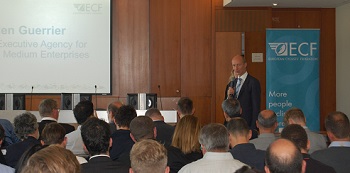
Future Cycling Conference: Cycling in Europe Strengthened by Innovation and Investment Commitment
The European Cyclists’ Federation’s “Future Cycling” Conference was a highlight of the Brussels’ Week of Cities and Regions, and brought together high profile public figures, key players in civil society and the cycling industry, to put European funding and innovation into the spotlight.
ECF President and Deputy Mayor of Paris for Transportation, Mobility, Roadway and Public Space, Christophe Najdovski launched the conference with an appeal for cross-sectoral collaboration, which he considers to be a necessity to create a sustainable Europe where cycling and walking is the basic mobility system for all.
“European cycling needs strong voices from civil society, investment from public bodies and innovation from the private sector”

Representatives from the European institutions followed, and their message was clear. The political will and multi-billion Euro budget for increasing and improving cycling in Europe is there - but it needs to be demanded.
Herald Ruijters, Director of Investment, Innovative & Sustainable Transport from the EU’s mobility directorate, confirmed that the EU understands that investment in cycling is necessary to create livable cities, and tackle pressing urban issues, such as road safety, congestion and health and air quality. He affirmed Christophe’s assertion that every actor operating at every level needs to come together, needs to be ambitious and needs to step up efforts to increase the budget committed to growing cycling through regional investment and industrial innovation.
Michael Cramer, Member of the European Parliament, Transport and Tourism Committee, followed by emphasizing the significance of creating a level playing field for cycling in the EU.
“Transport is the only sector with an increase of Co2 emissions since 1990…we can’t fight climate change without changing transport”
He then turned to the key opportunities and challenges that face cycling in the European Parliament’s latest legislative processes, drawing on recent advocacy successes in: passenger rights, general (vehicle) safety and road infrastructure safety regulations.
Julien Guerrier, Director, EASME, Executive Agency for Small and Medium Enterprises began his presentation by reminding the delegates that:
“Cycling is the healthiest, fastest, reliable and cheapest way to go to work in our cities”

He stressed the growing importance of the European Commission’s role in implementing cycling policy through different environmental programmes, including LIFE+ and Horizon2020. He restated that the Commission wants and needs NGOs to support effective policy implementation, referring to ECF as an example of a reliable partner that plays a key role shaping the cycling policy process.
The second part of the session turned to case study examples of EU funded projects that provide opportunities for greater cycling across Europe.
Jesús Huertas García, General Director Infrastructures, Ministry of Transport and Housing from the Junta de Andalucía, presented what is being done on a regional level in Spain to facilitate sustainable mobility and cycling. He introduced the Andalusian Regional Cycle Plan, which aims to invest 440 million Euros. The flagship of the plan is a regional cycle network inspired by EuroVelo’s Atlantic and Mediterranean routes. He closed his talk by inviting the audience to experience the cycle routes and good weather of Southern Spain in person.
Richard Armitage, Chair of the European Cycle Logistics Federation, shared the exciting innovation that has been supported by the Commission’s Horizon2020 program in Manchester. The City Changer Cargo Bike project has been at the forefront of using cyclelogistics to provide daily services, such as the replacement of delivery vans with cargo bikes, which has resulted in a substantial increase in efficiency.
“Delivery by bike increased the amount of deliveries per hour from 6-8 to 10-12…It just makes commercial sense to use bicycles”

Armitage affirmed that EU funding unlocks growth, and has enabled his organization to take innovation to new places, and raise the status of the cycle logistics sector in Europe.
Graeme Maclean, Project Manager for Developing Mountain Biking in Scotland, described how an injection of EU funds into the Scottish economy after the foot-and-mouth disease crisis enabled innovative projects to grow out of environmental disaster. Developing Mountain Biking in Scotland emerged as one of these projects, which set up multiple trail centers across Southern Scotland, with a reported 500,000 visitors per year enjoying Scotland’s natural beauty by bike.

More images of the event can be found here.
Contact the author
Recent news!
Upcoming events
Contact Us
Avenue des Arts, 7-8
Postal address: Rue de la Charité, 22
1210 Brussels, Belgium









